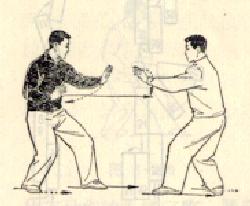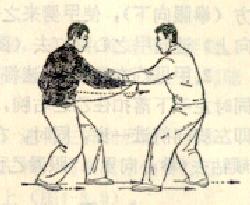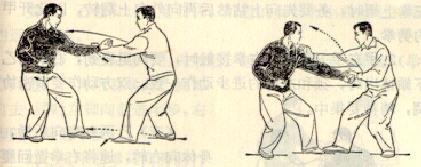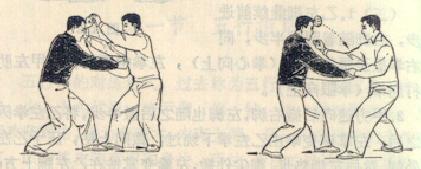June 2001 (Part 3)
SELECTION OF QUESTIONS AND ANSWERS

The illustrations here and below are taken from a Chinese text on Hsing Yi Kungfu. Basically Hsing Yi Kungfu is composed of “Five Elemental Fists”, namely Peng, Bao, Pi, Zuan and Heng. These five fists look simple, but they are adequate for a skilful exponent with internal force to handle all attacks, including kicks, holds and throws! For more variety Hsing Yi Kungfu also employs “Twelve Animal Forms”. In this picture, two Hsing Yi exponents observe each other in their typical “Three-Treasure Stance”, where most frequently the left leg is in front.
Question 1
I am a 40 year old man from Greece with a multitude of psychosomatic symptoms due to long-standing depression. I would like to elaborate in order to provide a detailed picture of my condition.
— Philip, Greece
Answer
What I like best about your e-mail is the last sentence, “I hope one day I become a very happy, kind and loving person -- the strongest of my childhood dreams”.
You already have two of the qualities — being kind and loving. These qualities are the hallmarks of all great teachers, including Jesus and the Buddha. I am sure you will have happiness too, and I shall try my best to help you to attain it.
You will be happy to know that from the chi kung point of view, your problems are actually not difficult to be overcome! This does not mean your problems are not pressing, nor your suffering not agonizing. They are, but the fact is that overcoming your problems is easier than overcoming more “physical” problems like asthma, diabetes and cancer. And I have helped countless people overcome these more “physical” problems; I have also helped countless people overcome psychosomatic problems like yours.
First I shall give a general explanation of your problems from the Chinese medical perspective, then I shall suggest practical steps to handle each of your problems.
To have a better understanding of your problems, you have to be aware that there are many ways to look at health and illness. The conventional medical paradigm of the West, which you are very familiar with, is not the only way. But if you are trained in this paradigm and are so used to it, you may often without your conscious knowing view your problems from the perspective of this paradigm.
I am going to use another paradigm, the traditional medical paradigm of the Chinese. It is also the paradigm that has maintained the health and sanity of the largest population of the world for the longest period of known history. More importantly, it is the paradigm that has helped literally millions of people overcome problems like yours.
According to the Chinese medical paradigm, there is only one illness, namely yin-yang disharmony, although there may be countless symptoms. Yin symbolizes your body's adjustment to constantly changing environment inside and outside your body. Yang symbolizes all the factors that cause changes which may lead to illness.
When yin and yang are in harmony, you have good health — physically, emotionally and mentally. The most inspiring fact is that yin-yang harmony is natural, and yin-yang disharmony unnatural. This means that by nature, without you having to do anything, you have yin-yang harmony.
What maintains yin-yang harmony? The answer, in Chinese medical jargon, is harmonious energy flow. In English, but in a verbose way, it means let good energy flow to your heart to enable the heart to work naturally; let good energy flow to your lungs to enable the lungs to work naturally; let good energy flow to your brain to enable the brain to work naturally, and so on with every part of your body.
For some intermediate reasons, your yin-yang harmony is distorted, which means you are now not healthy. Since yin-yang disharmony is unnatural, your illness is only temporary and therefore can be rectified. In your case, your yin-yang disharmony manifests as depression, anger, guilt, and other negative emotions. These negative emotions further distort your physiological and mental functions, resulting in poor digestion, poor urination, poor eye sight, and inability to relax and to concentrate.
In other words, some intermediate factors — x, y or z — cause environmental changes inside or outside your body, and you body fails to adjust to these changes. As a result you become ill with your various symptoms. By nature your body should be able to adjust, but because of some intermediate reasons — a, b or c — you have temporarily lost this ability.
One crucial difference between Western medical approach and chi kung approach is that in Western medicine it is necessary to find out what a, b, c, and x, y, z are so as to effect a cure, but in chi kung this is not necessary! As you are so used to the Western medical approach, I would once again remind you to make this paradigm shift if you wish to understand and benefit from chi kung in overcoming your problems.
Because chi kung works with the root cause, it is not necessary to worry about intermediate factors or causes. The root cause is that your energy is not flowing harmoniously. Your fundamental task, therefore, is to restore your harmonious energy flow. The best way is to learn and practise genuine chi kung from a master. The forte of chi kung is to restore and enhance harmonious energy flow. But if you practise gentle exercise from a master, or practise chi kung from a mediocre instructor, you would not have the desired result.
Once your harmonious energy flow is restored, irrespective of whether you know what a. b, c or x, y, z are, you will restore your yin-yang harmony, and your problems will disappear as a matter of course. As an analogy, irrespective of whether you know what protein, fat or carbohydrate are, or what enzymes dissolve them, once your digestive system is working naturally, you will be able to digest food. Irrespective of whether you know the names of the bacteria or virus that attack you, or their size, shape and life-span, once your immune system is back to normal, you will naturally clear away the harmful bacteria or virus.
Question 2
Since the age of 6 I have felt lonely, isolated, sad, angry, frustrated, ashamed, withdrawn to myself, out of place with family and friends, and I have been unable to:
- express feelings, thoughts and emotions,
- develop social skills,
- carry out my plans and reach my goals, and
- think solutions to my problems or ask for help.
Answer
Your illness, or yin-yang disharmony, was caused by intermediate factors long ago, and has affected both your body and psyche deeply. That is why you have so many symptoms. But don't worry. Genuine chi kung can overcome your problems.
You are not as bad as you think. In your e-mail you expressed your feelings, thoughts and emotions clearly, and you asked for help effectively. The fact that you are a medical doctor is evident you can carry out plans, reach goals, and think solutions to problems. You may not like to be a doctor, but it is undeniable that doctors came from the most brilliant of any school population.
Whenever you feel ashamed or nervous, remind yourself that you are actually more intelligent and more intellectual than many other people. And you successfully completed a university course that is meant for the brightest.

A (the exponent on the left) moves forward and executes a Peng technique with his right fist. The Peng technique in Hsing Yi Kungfu, which is a thrust punch with the fist in a vertical position, is different from the Peng technique in Taijiquan, which is warding-off with the forearm. A moves forward in a typical Hsing Yi movement as follows. He places his front left leg a step in front, and immediately follows with his back right leg behind. The body weight is on the back leg.
Question 3
I have had few short lived periods of true happiness and serenity but most of my life has been a struggle and a disappointment.
Answer
Life is always a struggle — right from the beginning to the end, and from the micro to the macro levels. The sperm struggles very hard to beat millions of other sperms to fertilize the egg. The baby struggles very hard to emerge from its mother's womb.
All through life every cell in your body struggles to take in good energy and give off toxic waste. Your whole organism struggles very hard to co-ordinate every part of your body in a marvellous, wholesome way to maintain life. Your body has done that so naturally that you do not even realize it. You represent the triumph of these struggles. Therefore you should be joyful, not disappointed.
Question 4
My problems have been severe since 1990 and unresponsive to various kinds of therapy. I feel “stuck” in the past, unable to forgive and “let go”, blaming myself and others, and various mistakes and wrong decisions which keep building up. I sense a tremendous resistance to change in my part and an inexplicable fear for the future. My anger, guilt, sorrow and despair seem endless.
Answer
You have to break off from your miserable past, live the present as best as you can, and have hopes for the future.
The best way is to attend my Intensive Chi Kung Course in Malaysia. Please refer to http://www.shaolin.org/general/ck- course.htm for details and apply to my secretary.
In the course you will learn how to generate an internal energy flow which will cleanse off your past miseries, including feelings of anger, guilt, sorrow and despair. Like many of my students before you, you will be amazed that with the energy and peace of mind you will develop in the course, you can actually overcome your problems. You will wonder why you have not done this earlier.
The course will take only five days, including the day of arrival and departure. Stay for another week in Malaysia, or any country in the Far East. During this week you will be on your own. Don't think of your past, and don't think of your work. Just spend the time practising your chi kung, and enjoying yourself visiting interesting places and experiencing new, exotic culture. I want you to have a clear break with your past before you return to your home.
When you have returned home, do not return to your work or your old environment immediately. Spend a week in some new places, practising chi kung and enjoying yourself, like what you did in Malaysia. You will find that you will have become a new person with new hopes and a bright future.
Question 5
Periods of apathy are relatively short lived. I have completely lost interest in my job which I never liked.
Answer
This is because you have allowed yourself to be in the same miserable environment that has depressed you. Get out from this environment, even for two weeks. Return to it only when you have become a new person, after you have cleansed off your past miseries, and after you have acquired new energy and new hopes.
The problem with your lack of interest in your job, is not because of your job, but because of you. If you have not changed, even if you have changed to another job you would still feel miserable. Chi kung will help you to change into a new, positive person. With this change you will find your job, or any job, interesting.

As A attacks with a Peng technique, which is a thrust punch (see above), B (the exponent on the right) moves back in a typical Hsing Yi movement to avoid the punch. He first places his right back right leg backward, and immediately moves his left front leg backward accordingly, still keeping it in front of his right back leg.
Question 6
Every organ in my body is affected. I am in a state of constant severe anxiety and fatigue with panic attacks, and “racing” thoughts. I am unable to relax or get a good night's sleep. Severe pain and stiffness occur in many points in my head, neck, spine, abdomen, pelvis and upper extremities. Shortness of breath and chest pressure at rest and exertion are constantly present. My digestion, elimination, urination and sexual function are very poor. I cannot see or think clearly and have extreme difficulty concentrating on anything.
Answer
Although conventional Western medical philosophy may not be able to explain your problems satisfactorily, chi kung philosophy does so clearly and scientifically. By “scientifically” I do not mean using Western technological vocabulary, but I mean using universal scientific principles like objectivity, predictability and verifiability.
Your many problems are closely inter-related, due to blockage at various points in your energy network. Once the blockage is cleared and your energy flowing harmoniously again, you will regain your health — physically, emotionally, mentally and spiritually. Chi kung is an excellent way to clear the blockage and restore harmonious energy flow.
Question 7
I hope that some day I will be able to practice and enjoy chi kung, kung fu, meditation and yoga, and become a good dancer of Latin American styles. Some of the above are childhood dreams. I also hope to improve the education system especially in medical schools.
Answer
Your first wish can be realized soon. Apply to my secretary for my Intensive Chi Kung Course in July.
I am confident that chi kung will overcome your problems and make life worth living for you. When you have regained your health and confidence, which I am sure you will do, you can decide on your other wishes like enjoying kungfu, meditation, yoga and Latin American dancing.
I am glad that you wish to improve the educational system in Western medical schools. As a medical doctor you are eminently suited to the task. And your successful and rewarding experience of chi kung, which I am sure you will have, will enable you to persevere in the noble task with conviction and dedication.
There is a lot that chi kung in particular and Chinese medicine in general can do for the West. I am at present working on my manuscript on Chinese Medicine, which I hope to publish soon. You will find much useful information in this book. If you need help, please don't hesitate to contact me.
Question 8
Most importantly I hope one day I become a very happy, kind and loving person -- the strongest of my childhood dreams.
Answer
This is most important -- from the perspective of both cause and effect. Your very strong wish to be happy, kind and loving will enable you to realize your wish. We and the whole universe are what our mind thinks. Both ancient Eastern philosophy and the latest Western science proclaim the same cosmic truth. When our mind has noble thoughts, we become noble. When our mind interprets a mass of energy as an elephant, that mass becomes an elephant.
Besides describing the cosmic truth, Eastern philosophy also points us to the correct path. We should not merely have thoughts; we should have noble thoughts. Wishing to be happy, kind and loving is to have noble thoughts.

A turns his left forearm in a small circle to release B's grip and then grips B's wrist in return, lifts up B's left hand, and simultaneously strikes B's ribs with his right vertical fist, using a Bao technique.
Question 9
I have been studying Hsing-I for approximately one year and I really enjoy it because it has made me a better person in my daily life. Lately, I have been branching out to study Karate in addition to my Hsing-I because I need more sparring to improve my fighting abilities.
— Yupi, USA
Answer
Xingyiquan, or Hsing Yi Kungfu, is one of the three famous internal Chinese martial arts, the other two being Taijiquan and Baguazhang. In my opinion, it is superior to karate. This, of course, is only my opinion; karate masters would think differently.
There are many justifications for my opinion. One of the most important, as mentioned by you, is making its practitioners better persons by cultivating their jing, qi, and shen, or body, energy and spirit, in contrast to karate which is basically a fighting art.
Karate masters may also say that their art cultivates body, energy and spirit, but to me this is not so. For example, a karate exponent frequently sustains injuries in his sparring, after a session he has less energy than before the session, and his spirit is often tensed and agitated during training. On the contrary, the emphasis on qi flow in Hsing Yi Kungfu relieves the exponent of injuries and illness, after a session he has more energy than before the session, and he is always calm and fresh during his practice.
As a fighting art, Hsing Yi Kungfu is formidable, as evident in your employing Hsing Yi skills and techniques when sparring with karate classmates. This does not mean your practising karate is not useful. As you have mentioned, it supplements your sparring practice in Hsing Yi Kungfu.
However, for various reasons, Hsing Yi Kungfu is losing its popularity today. As you have a good Hsing Yi teacher and you are a good student as evident from your e-mail, I hope you will train hard and one day restore the glory of Hsing Yi Kungfu.
Question 10
When I spar in karate, I often use the “Peng” technique of Hsing-I to hit my sparring partner in his dantian. I choose the Peng and the Bao techniques in Hsing-I to specialize on by practicing the techniques hundreds of times in one day and use them in my sparring.
My karate teacher tells me that the Peng technique is useless, that it does not work in real life. He tells me to concentrate on just attacking the head of my opponent, disregarding other body parts.
Answer
You are doing the right things. Practising the Peng and the Bao, or other Hsing Yi techniques, hundreds of times daily is a right way in genuine kungfu training — something virtually all Hsing Yi masters did in the past though they might not necessarily have chosen Peng and Bao for their specialization. Applying what you have arduously trained to your sparring practice is another right thing.
But you are only one year into Hsing Yi Kungfu. It is too early for you to specialize. You should also practise the other three of the “five elemental fists”, namely Pi, Heng and Cuan — hundreds of times daily.
By saying that the Peng technique is useless, and that you should only concentrate on attacking your opponent's head, the karate teacher shows his limited knowledge. The Peng technique was not invented by you, nor by your Hsing Yi's teacher, but was evolved and perfected by centuries of Hsing Yi masters from real fighting. If it were not useful, it would have been discarded long ago.
Even in karate, an exponent does not just attack the opponent's head. To do so would be brutal, as injury to the head may be fatal. Besides unnecessarily limiting his range of attacks, the exponent voluntarily makes the combat easy for his opponent, who needs not worry about other parts of his body. Constantly going after the opponent's head also means the middle and lower body of the exponent are constantly exposed.
It is comparatively easy to counter head attacks. The Bao technique in Hsing Yi is excellent for this purpose. As your opponent attacks your head, you deflect his attack slantingly upward with one hand and simultaneously strike him with the other. As he continues to go for your head, you continue repeating the Bao technique, striking his face or chest each time he attempts to attack. Of course you do not really strike him, but gently touch him to indicate you could have struck.
If he, seeing an opening and disregarding the karate teacher's advice on head attacks, changes to attack the seemingly exposed ribs under your raised arm of your Bao technique, you can bring down your arm sharply using the Pi technique. Be careful. If you have been training the Pi technique hundreds of times daily, this chopping down technique may fracture your opponent's attacking arm. Do be gentle on him. Then shove your fist to his chest or jaws with your Peng or Cuan technique.
Question 11
But when I spar with my sparring partner in Hsing-I and manage to tap his dantian, my Hsing-I teacher tells me that it is a good hit. This confuses me. I do not know which statement is true. If it turns out that my karate teacher is right, then I have been wasting my time practicing the Peng and the Bao techniques. I practice everyday for one and half hours and never miss a single practice. As a result, when I spar even with people above my level, I could tap their dantian within a short period of time.
Answer
Your Hsing Yi teacher and you are right. You have spent your time well. Developing your internal force and perfecting the skills in applying the Hsing Yi techniques — the inevitable results of your practising the Peng and the Bao techniques diligently — is a sure way to combat efficiency.
Haphazardly going after each other's head is brawling, and is physically and psychically injurious to both brawlers. If you continue training your Hsing Yi techniques hundreds of times daily for another two years, do not be surprised your karate teacher may not be a match for you in sparring.
Yupi confirmed as follows:
Thank you very much for replying to my e-mail. I am now very confident on what I am practicing. You are absolutely right about Hsing-I being more superior to karate. I always feel relaxed after hours of sparring in Hsing-I, and I have more energy after a sparring session than before. It's like I can go for that one extra mile.
However, after an hour of training in karate, my muscles are very tensed and I lose my voice because I have to yell a lot. Every time I try to use karate techniques on bigger opponents, I get hit a lot. This happens very often since I am a very small person. At one time, I got my lips torn because of this. However, I always manage to use Hsing-I techniques that I have learned despite my apparent disadvantage in size.
As you have suggested, I am now training all of the five elemental fist hundreds of times daily. I will keep on repeating the same technique over and over again until I can use them properly in free sparring.
